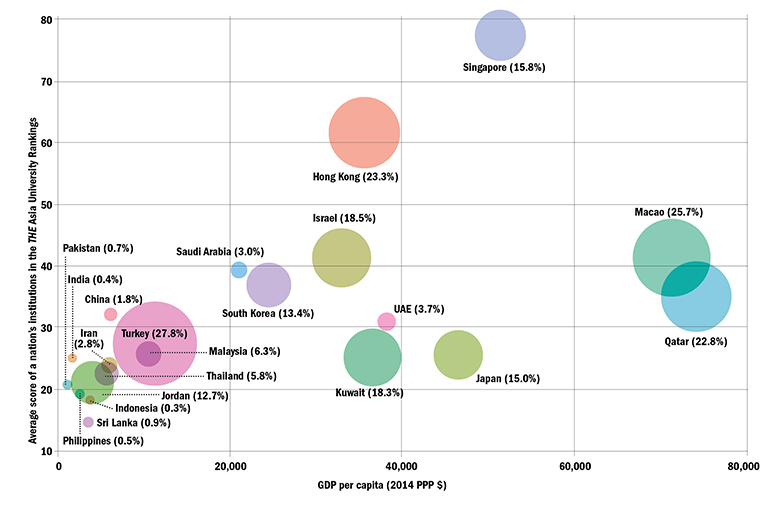Browse the full Asia University Rankings 2017 results
The graph below shows how university excellence relates to country income in Asia and the availability of higher education in each of the countries featured in the THE Asia University Rankings 2017.
In general, wealthier countries tend to perform better in the rankings; the higher a country’s gross domestic product (GDP), the higher the average score of its institutions in the rankings.
However, this correlation appears to fade for countries with a GDP per capita of more than $40,000 (£32,000).
Availability of higher education by income
Claim a free copy of the Asia University Rankings 2017 digital supplement
While universities in Singapore and Hong Kong both punch above their weight relative to their region’s income, those in Kuwait, Japan, the United Arab Emirates and Qatar underperform compared with what would be expected based solely on their wealth.
The graph also illustrates the proportion of university-aged people attending institutions that are in the Asia University Rankings; the larger the circle, the higher the proportion.
While Turkey, Macao, Hong Kong and Qatar have high proportions of their young people (about a quarter in each case) attending their top research universities, in Indonesia, Pakistan, Sri Lanka, India, the Philippines and China just 2 per cent or less of their student-aged citizens are enrolled at their leading institutions.
The graph is based only on universities that are in the Asia University Rankings.
POSTSCRIPT:
Print headline: Wealth matters
Register to continue
Why register?
- Registration is free and only takes a moment
- Once registered, you can read 3 articles a month
- Sign up for our newsletter
Subscribe
Or subscribe for unlimited access to:
- Unlimited access to news, views, insights & reviews
- Digital editions
- Digital access to THE’s university and college rankings analysis
Already registered or a current subscriber? Login









